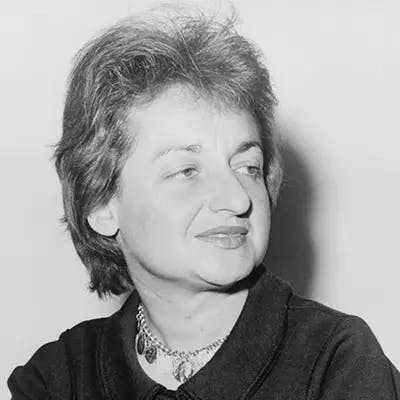Betty Friedan
Redefining Femininity
Intro
American feminist, journalist, writer, and activist Betty Friedan is one of the most influential feminist thinkers of the 20th century. She is most well known for her bestselling book, The Feminine Mystique, where she dissects the myth of the 1950’s happy American housewife, and reveals how institutions of male power propagate a controlling and psychologically limiting view of women’s potential.
Referred to by some as the “mother” of second wave feminism, her ideas helped awaken middle class women to their psychological subjugation. Her work as an activistcreated many of the first women’s liberation groups, which overturned several regressive lawsand created awareness for injustices including abortion laws, unequal pay, and workplace discrimination.
While less of a household name than other feminists, Friedan’s work was incredibly influential in changing the paradigm and social contract of her time. Her innovative perspective provided a model for women to liberate themselves from societal expectations, and find fulfillment in education, politics, and a career.
Who knows what women can be when they are finally free to be themselves.
- Betty Friedan
On their shoulders
For millennia, great thinkers and scholars have been working to understand the quirks of the human mind. Today, we’re privileged to put their insights to work, helping organizations to reduce bias and create better outcomes.
The Feminine Mystique
Friedan’s largest contribution came from her analysis of the feminine mystique. This term, coined by Friedan, described the pervasive cultural narrative, which claimed women are naturally fulfilled through subservience to their husbands and families. Propagated by then-male-dominated institutions such as publishing and psychology, the feminine mystique promoted housework, sexual submissiveness, marriage, and motherhood as the sole antidotes to a woman’s feeling of alienation. In this view, it would be unreasonable for a woman to have a job, pursue political office, or education, as everything they need for fulfillment can be found in the home. Friedan, in her 1963 landmark book The Feminine Mystique, challenged the feminine mystique and the institutions which forwarded it.
Friedan’s discovery of the feminine mystique came from a turning point in her life. Despite being a young, intelligent woman building a career in journalism, like many women of her time, Friedan gave up her career once she married and had children. Her family had a comfortable, middle class life, yet, Friedan had an uneasy feeling of dissatisfaction in her role as a housewife. She had achieved the conditions which should make her feel happy and fulfilled, but she felt hollow.
Writing a freelance gig, Friedan conducted a survey of her university graduating class, and soon found hundreds of housewives experienced a similar feeling of alienation, yet didn’t know what was causing it. Friedan, who had a background in psychology, deemed this dissatisfaction was caused by the feminine mystique, which failed to deliver the happiness and satisfaction it promised to women across America.
Friedan’s central critique in The Feminine Mystique involves Maslow’s Hierarchy of Needs, a model of human potential, which states that once relational and physical needs are satisfied, we must pursue needs of growth and purpose. Theideal, middle class family of the 1950’s would have enough food to eat, a roof over their heads, and loving relationships with each other. Friedan suggested this idealization robs women of their final need -to discover one’s own self and purpose.
To escape this cycle, Friedan urged women to pursue an education and meaningful careers. She pioneered the idea of women having both a career and a family. This drastic reassessment of femininity was a key catalyst for second wave feminism, causing many women to question their role in their households and society. Friedan caused a paradigm shift in broader culture, and inspired many women to pursue education, careers, and other activities that made them feel fulfilled.
Historical Biography
Betty Friedan was born Betty Naomi Goldstein in Peoria, Illinois in 1921. A daughter of Eastern European Jewish parents, Friedan began to experience discrimination from an early age, for her religion and her gender. Despite being a highly-intelligent young woman, Friedan recalls many instances where teachers, family members, and peers chastised her, denied her potential, and suggested that she focus on more traditionally female ventures than academia.
Ignoring the critics, Friedan went onto graduate summa cum laude from Smith College with a degree in psychology. In university, her political involvement blossomed, as the rise of fascism and the Great Depression ignited her interests in injustice. She began writing for her school newspaper, where she advocated for labor rights and progressive politics.
After her undergraduate degree, she went on to graduate studies at the University of California Berkeley to continue her education as a psychologist. However, she dropped out and moved to New York, where she began her career as a journalist, writing for left-wing outlets like the Federated Press and UE News.
A few years later, she married Carl Friedan and promptly had three children. While she would continue to write freelance for women’s magazines, she would soon quit her career as a journalist to become a suburban housewife. Instead of feeling fulfilled by her new role, Friedan began to despair, as she felt her potential being limited. Realizing other housewives felt the same malaise, she began to conduct research into what would soon become The Feminine Mystique. A five-year flurry of surveys, interviews, and academic work allowed her to outline how the career-minded, independent “New Woman” of her youth had suddenly transformed into the docile 1950’s housewife, and how the feminine mystique promoted this image.
The Feminine Mystique, published in 1963, struck a chord with women across America. It sold over 3 million copies in its first year and mobilized millions of women to reignite the dwindling feminist movement. This mobilization was key in causing the second wave of feminism.
In addition to writing, Friedan began contributing to the feminist movement as an organizer. In the following 20 years, Friedan founded multiple movements and organizations, co-founding the National Organization for Women, National Association for the Repeal of Abortion Law, and the National Women’s Political Caucus. These institutions were key players in dismantling workplace systems of oppression, including pay inequality, pregnancy discrimination, and gender-biased hiring.
Friedan died of heart failure in 2006, but her impact lives on. While there is still work to be done, we can certainly see that most professions have seen a levelling between men and women. Women across the developed world now enjoy fulfilling careers, and vastly greater choice over what they want to do with their lives. By redefining femininity as something that is not solely tied to domestic life, Friedan’s impact has influenced all institutions where women are involved.
Relevant Quotes
“The feminist revolution had to be fought because women quite simply were stopped at a state of evolution far short of their human capacity.”
- Betty Friedan
“The problem lay buried, unspoken, for many years in the minds of American women. It was a strange stirring, a sense of dissatisfaction, a yearning that women suffered in the middle of the twentieth century in the United States. Each suburban wife struggled with it alone. As she made the beds, shopped for groceries, matched slipcover material, ate peanut butter sandwiches with her children, chauffeured Cub Scouts and Brownies, lay beside her husband at night -she was afraid to ask even of herself the silent question- ‘Is this all?’”
- Betty Friedan
“The only way for a woman, as for a man, to find herself, to know herself as a person, is by creative work of her own.”
- Betty Friedan
“In almost every professional field, in business and in the arts and sciences, women are still treated as second-class citizens. It would be a great service to tell girls who plan to work in society to expect this subtle, uncomfortable discrimination--tell them not to be quiet, and hope it will go away, but fight it.”
- Betty Friedan
“There was a strange discrepancy between the reality of our lives as women and the image to which we were trying to conform, the image that I came to call the feminine mystique.”
- Betty Friedan
Books by Betty Friedan
The Feminine Mystique: This seminal work outlined the cultural phenomenon of middle class American housewife malaise. By condensing academic techniques into a consumable format, Friedan dissects the housewife’s cultural dissatisfaction of the 50’s and 60’s.
The Second Stage: Twenty years after The Feminine Mystique, Friedan authored her second most influential book, The Second Stage. In this book, she reexamines the developments and pitfalls of feminism, and proposes next steps for the movement.
Beyond Gender: The New Politics of Work and Family: As an innovator, Friedan’s work was not limited to feminist literature. In Beyond Gender, Friedan extended her work to the economy, outlining how the current economic arrangement damages family dynamics.
Life So Far (Autobiography): Betty Friedan’s autobiography is an intimate look into her life and career, describing key factors that made her dedicate her life to the fight for social justice
Books about Betty Friedan
Betty Friedan and the Making of "The Feminine Mystique": The American Left, the Cold War, and Modern Feminism: Betty Friedan, as well as The Feminine Mystique, are often criticized for ignoring intersectional politics. Some critics believe she is a relic of the past, who only advocated for the rights of middle class, white women. Author Daniel Horowitz argues that the Cold War context forced Friedan to downplay her radical ideas to achieve liberation, and explores Friedan’s history with left wing politics and radical, intersectional movements.
References
Dreier, P., Nicole Hemmer, N. M. P., Luke Mergner, P. S., Omri Boehm, M. B., & Carrizosa, M. (2021, March 4). Betty Friedan's Radical Century. Public Seminar. https://publicseminar.org/essays/betty-friedans-radical-century/.
Churchill, L. B. (n.d.). The Feminine Mystique. Encyclopædia Britannica. https://www.britannica.com/topic/The-Feminine-Mystique.
Friedan, B. (1963). The feminine mystique. W.W. Norton & Company.
History.com Editors. (2009, November 9). Betty Friedan. History.com. https://www.history.com/topics/womens-history/betty-friedan.
Biography.com Editors. (2020, April 7). Betty Friedan. Biography.com. https://www.biography.com/activist/betty-friedan.
Fetters, A. (2017, January 10). 4 Big Problems With 'The Feminine Mystique'. The Atlantic. https://www.theatlantic.com/sexes/archive/2013/02/4-big-problems-with-the-feminine-mystique/273069/.
Michals, E. by D. (2017). Betty Friedan. National Women's History Museum. https://www.womenshistory.org/education-resources/biographies/betty-friedan.
Horowitz, D. (2000). Betty Friedan and the Making of the Feminine Mystique: the American Left, the Cold War and Modern Feminism. Univ. Massachusetts P.
About the Authors
Dan Pilat
Dan is a Co-Founder and Managing Director at The Decision Lab. He is a bestselling author of Intention - a book he wrote with Wiley on the mindful application of behavioral science in organizations. Dan has a background in organizational decision making, with a BComm in Decision & Information Systems from McGill University. He has worked on enterprise-level behavioral architecture at TD Securities and BMO Capital Markets, where he advised management on the implementation of systems processing billions of dollars per week. Driven by an appetite for the latest in technology, Dan created a course on business intelligence and lectured at McGill University, and has applied behavioral science to topics such as augmented and virtual reality.
Dr. Sekoul Krastev
Sekoul is a Co-Founder and Managing Director at The Decision Lab. He is a bestselling author of Intention - a book he wrote with Wiley on the mindful application of behavioral science in organizations. A decision scientist with a PhD in Decision Neuroscience from McGill University, Sekoul's work has been featured in peer-reviewed journals and has been presented at conferences around the world. Sekoul previously advised management on innovation and engagement strategy at The Boston Consulting Group as well as on online media strategy at Google. He has a deep interest in the applications of behavioral science to new technology and has published on these topics in places such as the Huffington Post and Strategy & Business.






